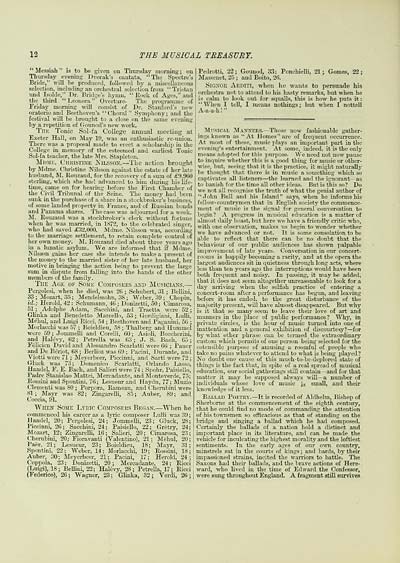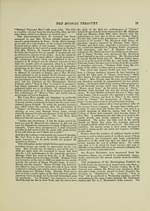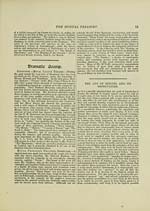Glen Collection of printed music > Printed music > Köhlers’ violin repository of dance music > Volume 3
(116) Page 12
Download files
Complete book:
Individual page:
Thumbnail gallery: Grid view | List view

12
THE MUSICAL TBEASVR7.
" Messiah " is to be given on Thursday morning ; on
Thursday evening Dvorak's cantata, "The Spectre's
Bride," will be produced, followed by a miscellaneous
selection, including an orchestral selection from " Tristan
und Isolde," Dr. Bridge's hymn, "Kock of Ages," and
the third "Leonora" Overture. The programme of
Friday morning will consist of Dr. Stanford's new
oratorio and Beethoven's "Choral" Symphony; and the
festival will be brought to a close on the same evening
by a repetition of Gounod's new work.
The Tonic Sol-fa College annual meeting at
E.xeter Hall, on May 19, was an enthusiastic re-imion.
There was a proposal made to erect a scholarship in the
College in memory of the esteemed and earliest I'onic
Sol-fa teacher, the late Mrs. Stapleton.
Mdme. Christine Nilsson.— The action brought
by Mdme. Christine Nilsson against the estate of her late
husband, M. Eouzaud, for the recovery of a sum of £9,960
sterling, which she had advanced to him during his life-
time, came on for hearing before the First Chamber of
the Civil Tribunal of the Seine. The money had been
sunk in the purchase of a share in a stockbroker's business,
of some landed property in France, and of Russian bonds
and Panama shares. The case was adjourned for a week.
M. Eouzaud was a stockbroker's clerk without fortune
when he was married, in 1872, to the celebrated singer,
who had saved £32,000. Mdme. Nilsson was, according
to the marriage settlement, to retain complete control of
her own money. M. Rouzaud died about three years ago
in a lunatic asylum. We are informed that if JWdme.
Nilsson gains her case she intends to make a present of
the money to the married sister of her late husband, her
motive in bringing the action being to prevent the large
sum in dispute from falling into the hands of the other
members of the family.
The Age of Some Composees and Musicians. —
Pergolesi, when he died, was 26 ; Schiibert, 31 ; Bellini,
33 ; Mozart, 35 ; Mendelssohn, 38 ; Weber, 39 ; Chopin,
id.; Herold, 42: Schumann, 46 ; Donizetti, .50; Cimarosa,
51 ; Adolphe Adam, Sacchini, and Traetta were 52 ;
Glinka and Benedetto MarceUo, 53; Gordigiani, Lxilli,
Me'hul, and Luigi Ricci, 54 ; Beethoven and Paganini, 56 ;
Morlacchi was 57 ; Boieldieu, 58 ; Thalberg and Hummel
were 59 ; Jommelli and Corelli, 60 ; Asioli, Boccherini,
and Halevy, 62 ; Petrella was 63 ; J. S. Bach, 6.^ ;
Felicien David and Alessandro Scarlatti were 66 ; Pauer
and De B(5riot, 68 ; Berhoz was 69 ; Pacini, Durante, and
Viotti were 71 ; Meyerbeer, Piccinni, and Sarti were 72 ;
Gluck was 73; Domenico Scarlatti, Orlando Lasso,
Handel, F. E. Bach, and Salieri were 74 ; Spohr, Paisiello,
Padre Stanislao Mattel, Mercadante, and Monteverde, 75;
Rossini and Spontini, 76; Lesueur and Haydn, 77; Muzio
dementi was 80 ; Porpora, Rameau, and Cherubini were
81; Mayr was 82; Zingarelli, 85; Auber, 89; and
Coccia, 91,
When Some Lveic Composers Began. — When he
commenced his career as a lyric composer Lulli was 39 ;
Handel, 20; Pergolesi, 24; JommeUi, 23; Gluck, 28;
Piccinni, 26; Sacchini, 24: Paisiello, 22; Gretry, 24;
Mozart, 12; ZingarelU, 16; Salieri, 20; Cimarosa, 23;
Cherubini, 20; Flora van ti (Valentino), 21; Mehul, 20;
Paer, 21; Lesueur, 23; Boieldieu, 18; Mayr, 31;
Spontini, 22; Weber, 14; Morlacchi, 19; Rossini, 18;
Auber, 30; Meyerbeer, 21; Pacini, 17; Herold, 24;
Coppola, 23 ; Donizetti, 20 ; Mercadante. 24 ; Ricci
(Luigi), 18; BeUini, 22; Halevy, 28; Petrella, 17; Ricci
(Federico), 26; Wagner, 23; Glinka, 32; Verdi, 26;
Pedrotti, 22; Gounod, 33; Ponchielli, 21; Gomes, 22;
Massenet, 25 ; and Boito, 26.
SiGNOR Arditi, when he wants to persuade his
orchestra not to attend to his hasty remarks, but when he
is calm to look out for squalls, this is how he puts it :
"When I tell, I means nothings; but when I notteU
A-a-a-h!"
Musical Manners.— Those now fashionable gather-
ings known as " At Homes " are of frequent occurrence.
At most of these, music plays an important part in the
evening's entertainment. At some, indeed, it is the only
means adopted for this purpose. We need not now pause
to inquire whether this is a good thing for music or other-
wise, but, seeing that it is the practice, it might naturally
be thought that there is in music a something which so
captivates all listeners — the learned and the ignorant— as
to banish for the time all other ideas. But is this so ? Do
we not all recognise the truth of what the genial author of
".John BuU and his Island" says, when he informs his
fellow- countrymen that in English society the commence-
ment of music is the signal for general conversation to
begin ? A progress in musical education is a matter of
almost daily boast, but here we have a friendly critic who,
with one observation, makes us begin to wonder whether
we have advanced or not. It is some consolation to be
able to reflect that there can be no doubt that the
behaviour of our public audiences has shown palpable
improvement of late years. Conversation in our concert-
rooms is happily becoming a rarity, and at the opera the
largest audiences sit in quietness through long acts, where
less than ten years ago the interruptions would have been
both frequent and noisy. In passing, it may be added,
that it does not seem altogether imreasonable to look for a
day arriving when the selfish practice of entering a
concert-room after a performance has begun, and leaving
before it has ended, to the great disturbance of the
majority present, will have almost disappeared. But why
is it that so many seem to leave their love of art and
manners in the place of public performance? Why, in
private circles, is the hour of music turned into one of
inattention and a general exhibition of discourtesy? — for
by what other i)hrase can be termed the extraordinary
custom which permits of one person being selected for the
ostensible purpose of amusing a roomful of people who
take no pains whatever to attend to what is being played ?
No doubt one cause of this much-to-be-deplored state of
things is the fact that, in spite of a real spread of musical
education, our social gatherings still contain — and for that
matter it may be supposed always will — a number of
individuals whose love of music is small, and their
knowledge of it less.
BALL.UD Poetry. — It is recorded of Aldhelm, Bishop of
Sherborne at the commencement of the eighth century,
that he could find no mode of commanding the attention
of his townsmen so efficacious as that of standing on the
bridge and singing a ballad which he had composed.
Certainly the ballads of a nation hold a distinct and
important place in its literature, and can be made the
vehicle for inculcating the highest morality and the loftiest
sentiments. In the early ages of our o^vn country,
minstrels sat in the courts of kings ; and bards, by their
impassioned strains, incited the wamors to battle. The
Sa.xons had their ballads, and the brave actions of Here-
ward, who lived in the time of Edward the Confessor,
were sung throughout England. A fragment still survives
THE MUSICAL TBEASVR7.
" Messiah " is to be given on Thursday morning ; on
Thursday evening Dvorak's cantata, "The Spectre's
Bride," will be produced, followed by a miscellaneous
selection, including an orchestral selection from " Tristan
und Isolde," Dr. Bridge's hymn, "Kock of Ages," and
the third "Leonora" Overture. The programme of
Friday morning will consist of Dr. Stanford's new
oratorio and Beethoven's "Choral" Symphony; and the
festival will be brought to a close on the same evening
by a repetition of Gounod's new work.
The Tonic Sol-fa College annual meeting at
E.xeter Hall, on May 19, was an enthusiastic re-imion.
There was a proposal made to erect a scholarship in the
College in memory of the esteemed and earliest I'onic
Sol-fa teacher, the late Mrs. Stapleton.
Mdme. Christine Nilsson.— The action brought
by Mdme. Christine Nilsson against the estate of her late
husband, M. Eouzaud, for the recovery of a sum of £9,960
sterling, which she had advanced to him during his life-
time, came on for hearing before the First Chamber of
the Civil Tribunal of the Seine. The money had been
sunk in the purchase of a share in a stockbroker's business,
of some landed property in France, and of Russian bonds
and Panama shares. The case was adjourned for a week.
M. Eouzaud was a stockbroker's clerk without fortune
when he was married, in 1872, to the celebrated singer,
who had saved £32,000. Mdme. Nilsson was, according
to the marriage settlement, to retain complete control of
her own money. M. Rouzaud died about three years ago
in a lunatic asylum. We are informed that if JWdme.
Nilsson gains her case she intends to make a present of
the money to the married sister of her late husband, her
motive in bringing the action being to prevent the large
sum in dispute from falling into the hands of the other
members of the family.
The Age of Some Composees and Musicians. —
Pergolesi, when he died, was 26 ; Schiibert, 31 ; Bellini,
33 ; Mozart, 35 ; Mendelssohn, 38 ; Weber, 39 ; Chopin,
id.; Herold, 42: Schumann, 46 ; Donizetti, .50; Cimarosa,
51 ; Adolphe Adam, Sacchini, and Traetta were 52 ;
Glinka and Benedetto MarceUo, 53; Gordigiani, Lxilli,
Me'hul, and Luigi Ricci, 54 ; Beethoven and Paganini, 56 ;
Morlacchi was 57 ; Boieldieu, 58 ; Thalberg and Hummel
were 59 ; Jommelli and Corelli, 60 ; Asioli, Boccherini,
and Halevy, 62 ; Petrella was 63 ; J. S. Bach, 6.^ ;
Felicien David and Alessandro Scarlatti were 66 ; Pauer
and De B(5riot, 68 ; Berhoz was 69 ; Pacini, Durante, and
Viotti were 71 ; Meyerbeer, Piccinni, and Sarti were 72 ;
Gluck was 73; Domenico Scarlatti, Orlando Lasso,
Handel, F. E. Bach, and Salieri were 74 ; Spohr, Paisiello,
Padre Stanislao Mattel, Mercadante, and Monteverde, 75;
Rossini and Spontini, 76; Lesueur and Haydn, 77; Muzio
dementi was 80 ; Porpora, Rameau, and Cherubini were
81; Mayr was 82; Zingarelli, 85; Auber, 89; and
Coccia, 91,
When Some Lveic Composers Began. — When he
commenced his career as a lyric composer Lulli was 39 ;
Handel, 20; Pergolesi, 24; JommeUi, 23; Gluck, 28;
Piccinni, 26; Sacchini, 24: Paisiello, 22; Gretry, 24;
Mozart, 12; ZingarelU, 16; Salieri, 20; Cimarosa, 23;
Cherubini, 20; Flora van ti (Valentino), 21; Mehul, 20;
Paer, 21; Lesueur, 23; Boieldieu, 18; Mayr, 31;
Spontini, 22; Weber, 14; Morlacchi, 19; Rossini, 18;
Auber, 30; Meyerbeer, 21; Pacini, 17; Herold, 24;
Coppola, 23 ; Donizetti, 20 ; Mercadante. 24 ; Ricci
(Luigi), 18; BeUini, 22; Halevy, 28; Petrella, 17; Ricci
(Federico), 26; Wagner, 23; Glinka, 32; Verdi, 26;
Pedrotti, 22; Gounod, 33; Ponchielli, 21; Gomes, 22;
Massenet, 25 ; and Boito, 26.
SiGNOR Arditi, when he wants to persuade his
orchestra not to attend to his hasty remarks, but when he
is calm to look out for squalls, this is how he puts it :
"When I tell, I means nothings; but when I notteU
A-a-a-h!"
Musical Manners.— Those now fashionable gather-
ings known as " At Homes " are of frequent occurrence.
At most of these, music plays an important part in the
evening's entertainment. At some, indeed, it is the only
means adopted for this purpose. We need not now pause
to inquire whether this is a good thing for music or other-
wise, but, seeing that it is the practice, it might naturally
be thought that there is in music a something which so
captivates all listeners — the learned and the ignorant— as
to banish for the time all other ideas. But is this so ? Do
we not all recognise the truth of what the genial author of
".John BuU and his Island" says, when he informs his
fellow- countrymen that in English society the commence-
ment of music is the signal for general conversation to
begin ? A progress in musical education is a matter of
almost daily boast, but here we have a friendly critic who,
with one observation, makes us begin to wonder whether
we have advanced or not. It is some consolation to be
able to reflect that there can be no doubt that the
behaviour of our public audiences has shown palpable
improvement of late years. Conversation in our concert-
rooms is happily becoming a rarity, and at the opera the
largest audiences sit in quietness through long acts, where
less than ten years ago the interruptions would have been
both frequent and noisy. In passing, it may be added,
that it does not seem altogether imreasonable to look for a
day arriving when the selfish practice of entering a
concert-room after a performance has begun, and leaving
before it has ended, to the great disturbance of the
majority present, will have almost disappeared. But why
is it that so many seem to leave their love of art and
manners in the place of public performance? Why, in
private circles, is the hour of music turned into one of
inattention and a general exhibition of discourtesy? — for
by what other i)hrase can be termed the extraordinary
custom which permits of one person being selected for the
ostensible purpose of amusing a roomful of people who
take no pains whatever to attend to what is being played ?
No doubt one cause of this much-to-be-deplored state of
things is the fact that, in spite of a real spread of musical
education, our social gatherings still contain — and for that
matter it may be supposed always will — a number of
individuals whose love of music is small, and their
knowledge of it less.
BALL.UD Poetry. — It is recorded of Aldhelm, Bishop of
Sherborne at the commencement of the eighth century,
that he could find no mode of commanding the attention
of his townsmen so efficacious as that of standing on the
bridge and singing a ballad which he had composed.
Certainly the ballads of a nation hold a distinct and
important place in its literature, and can be made the
vehicle for inculcating the highest morality and the loftiest
sentiments. In the early ages of our o^vn country,
minstrels sat in the courts of kings ; and bards, by their
impassioned strains, incited the wamors to battle. The
Sa.xons had their ballads, and the brave actions of Here-
ward, who lived in the time of Edward the Confessor,
were sung throughout England. A fragment still survives
Set display mode to: Large image | Transcription
Images and transcriptions on this page, including medium image downloads, may be used under the Creative Commons Attribution 4.0 International Licence unless otherwise stated. ![]()
| Special collections of printed music > Glen Collection of printed music > Printed music > Köhlers’ violin repository of dance music > Volume 3 > (116) Page 12 |
|---|
| Permanent URL | https://digital.nls.uk/91448462 |
|---|
| Shelfmark | Glen.224b |
|---|---|
| Additional NLS resources: | |
| Attribution and copyright: |
|
| Description | Scottish songs and music of the 18th and early 19th centuries, including music for the Highland bagpipe. These are selected items from the collection of John Glen (1833 to 1904). Also includes a few manuscripts, some treatises, and other books on the subject. |
|---|
| Description | The Glen Collection and the Inglis Collection represent mainly 18th and 19th century Scottish music, including Scottish songs. The collections of Berlioz and Verdi collected by bibliographer Cecil Hopkinson contain contemporary and later editions of the works of the two composers Berlioz and Verdi. |
|---|

